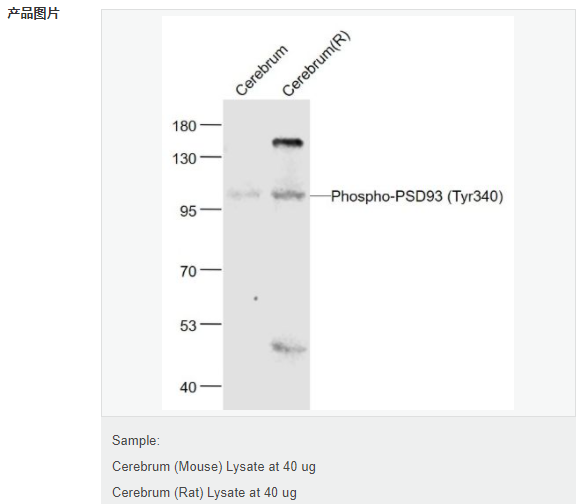

貨號(hào)
產(chǎn)品規(guī)格
售價(jià)
備注
BN40898R-100ul
100ul
¥2470.00
交叉反應(yīng):Mouse,Rat(predicted:Human,Chicken,Dog,Horse) 推薦應(yīng)用:WB,IHC-P,IHC-F,IF,ELISA
產(chǎn)品描述
| 英文名稱 | Phospho-PSD93 (Tyr340) |
| 中文名稱 | 磷酸化突觸后密度蛋白93抗體 |
| 別 名 | Channel associated protein of synapse 110; Channel associated protein of synapses 110kD; Channel-associated protein of synapse-110; Chapsyn 110; Chapsyn-110; Chapsyn110; discs large homolog 2; Discs, large homolog 2 (Drosophila); Disks large homolog 2; DKFZp781D1854; DKFZp781E0954; Dlg 2; dlg2; DLG2_HUMAN; Dlgh 2; Dlgh2; FLJ37266; Gm1197; MGC131811; Postsynaptic density protein PSD 93; Postsynaptic density protein PSD-93; Postsynaptic density protein PSD93; PSD 93; PSD93. |
| 產(chǎn)品類型 | 磷酸化抗體 |
| 研究領(lǐng)域 | 細(xì)胞生物 免疫學(xué) 神經(jīng)生物學(xué) |
| 抗體來(lái)源 | Rabbit |
| 克隆類型 | Polyclonal |
| 交叉反應(yīng) | Mouse, Rat, (predicted: Human, Chicken, Dog, Horse, ) |
| 產(chǎn)品應(yīng)用 | WB=1:500-2000 ELISA=1:5000-10000 IHC-P=1:100-500 IHC-F=1:100-500 IF=1:100-500 (石蠟切片需做抗原修復(fù)) not yet tested in other applications. optimal dilutions/concentrations should be determined by the end user. |
| 分 子 量 | 98kDa |
| 細(xì)胞定位 | 細(xì)胞膜 |
| 性 狀 | Liquid |
| 濃 度 | 1mg/ml |
| 免 疫 原 | KLH conjugated synthesised phosphopeptide derived from human PSD93 around the phosphorylation site of Tyr340:DD(p-Y)TR |
| 亞 型 | IgG |
| 純化方法 | affinity purified by Protein A |
| 儲(chǔ) 存 液 | 0.01M TBS(pH7.4) with 1% BSA, 0.03% Proclin300 and 50% Glycerol. |
| 保存條件 | Shipped at 4℃. Store at -20 °C for one year. Avoid repeated freeze/thaw cycles. |
| PubMed | PubMed |
| 產(chǎn)品介紹 | PSD 93 is believed to participate in the clustering of certain proteins, including N-methyl-D-aspartate (NMDA) receptors and shaker-type potassium channels at the synaptic membrane. There are two principal modes of interaction between PSD 93 and other proteins. NMDA receptors and shaker-type potassium channels both share C-terminal sequence homology consisting of a threonine/serine-X-valine-COOH (T/SXV) motif. Other neuronal proteins that share this motif (beta 1 adrenergic receptor, some serotonin receptors, some sodium channel subunits, and additional potassium channel subunits) may interact with PSD 93 by binding to its PDZ domains. Neuronal nitric oxide synthase (nNOS), which lacks the T/SXV motif but which has its own PDZ domain, has been shown to associate with PSD 93 in vitro through a pseudo-homotypic PDZ-PDZ interaction. Function: Required for perception of chronic pain through NMDA receptor signaling. Regulates surface expression of NMDA receptors in dorsal horn neurons of the spinal cord. Interacts with the cytoplasmic tail of NMDA receptor subunits as well as inward rectifying potassium channels. Involved in regulation of synaptic stability at cholinergic synapses. Part of the postsynaptic protein scaffold of excitatory synapses (By similarity). Subunit: Interacts through its PDZ domains with NETO1. Interacts with NOS1/nNOS through second PDZ domain (By similarity). Interacts with KCNJ2/Kir2.1 (via C-terminus) through one of its PDZ domains. Interacts with FRMPD4 (via C-terminus). Interacts with LRFN1, LRFN2 and LRFN4. Interacts with FASLG. Subcellular Location: Membrane; Lipid-anchor (By similarity). Cell junction, synapse, postsynaptic cell membrane, postsynaptic density (By similarity). Cell junction, synapse (By similarity). Note=Concentrated in soma and postsynaptic density of a subset of neurons (By similarity). Post-translational modifications: Palmitoylation of isoform 1 is not required for targeting to postsynaptic density (By similarity). Similarity: Belongs to the MAGUK family. Contains 1 guanylate kinase-like domain. Contains 3 PDZ (DHR) domains. Contains 1 SH3 domain. SWISS: Q15700 Gene ID: 1740 Database links: Entrez Gene: 1740 Human Entrez Gene: 23859 Mouse Omim: 603583 Human SwissProt: Q15700 Human SwissProt: Q91XM9 Mouse Unigene: 367656 Human Unigene: 147213 Mouse Unigene: 257035 Mouse Unigene: 202966 Rat Important Note: This product as supplied is intended for research use only, not for use in human, therapeutic or diagnostic applications. |
